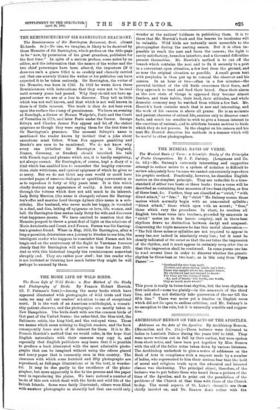THE REMINISCENCES OF SIR BARRINGTON BEAUMONT.
The Reminiscences of Sir Barrington Beaumont, Bart. (Grant Richards. 6s.)—No one, we imagine, is likely to be deceived by these Memoirs of Sir Barrington, which profess on the title-page to be "now, by permission of his great grandson, published for the first time." In spite of a serious preface, some notes by an editor, and the information that the names of the writer and the two chief personages have been altered, the imposture (if it deseives such a grave title) is so crudely and clumsily carried out that one scarcely thinks the writer or his publisher can have expected it to be taken seriously. Sir Barrington, the writer of the Memoirs, was born in 1756. In 1812 he wrote down these Reminiscences with instructions that they were not to be read until seventy years had passed. Why they should not have ap- peared sooner we are at a loss to discover. They tell us little which was not well known, and that which is not well known in them is of little interest. The truth is they do not bear even upon the surface the stamp of genuineness. We have an evening at Ranelagh, a dinner at Horace Walpole's, Paris and the Court of Versailles in 1778, and later Paris under the Terror. George Selwyn and Charles James Fox appear and let off the stalest epigrams as though they were saying them for the first time in Sir Barrington's presence. The moment Selwyn's name le mentioned the reader knows by instinct that a joke about executions must follow. When Fox appears gambling and Brooks's are sure to be mentioned. We do not know why every one (whether Sir Barrington is in England, France, Germany, or Sweden) should interlard his talk with French tags and phrases which are, it is hardly surprising, not always correct. Sir Barrington, of course, kept a diary of a kind which has enabled him to remember the lengthy conversa- tions, stale witticisms, and cynical epigrams of which he gives us so many. But we do not think any man would or could have recorded pages of amorous dialogue or sparkling conversation so as to reproduce it forty or fifty years later. It is this which chiefly destroys any appearance of reality. A love story runs through the volume which does not add much to its interest. Lady Betty Merrion (the name is changed) refuses Sir Barring- ton's offer and marries Lord George Aylmer (this name is a sub- stitute). Her husband, who never made her happy, is wounded in a duel, and dies, letting off epigrams on love, life, women, and helL Sir Barrington then makes Lady Betty his wife and discovers what happiness means. We have omitted to mention that the Memoirs purport to throw a great deal of light on the relations of Marie Antoinette and Count Axel Fersen. Fersen was Sir Barring- ton's greatest friend. When in May, 1810, Sir Barrington, after a long separation, determines on a journey to Sweden to see him, the intelligent reader who happens to remember that Fersen met his tragic end on the anniversary of the flight to Varennes foresees clearly that Sir Barrington will arrive in time for June 20th. And so with this historical tragedy the reminiscences somewhat abruptly End. They are rather poor stuff ; but the reader who is not irritated at thinking how much better they might be will perhaps be amused by them.


























































 Previous page
Previous page